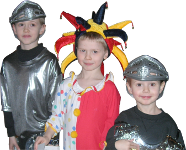Charlotte Mason – Book 3: School Education
Charlotte Mason begins this book by describing authority and docility. A mother should expect her children to obey her. The children are more likely to obey when she smiles and assumes they will obey. A mother must not be angry and autocratic and arbitrary. Instead she must be easy and kind, even in discipline. She must cause the child to obey without thinking, so that there is more effort required to disobey than to obey, which has become the subconscious habit. She should put her child's good first before her own convenience. She must keep in mind that authority was given to her by God.
Next Charlotte Mason discusses how to use “masterly inactivity” with her children. If you play with your children too much and don't leave them alone to do their own thing, they will never learn how to make their own fun. Making their own fun is part of imagination, creativity, and intelligence. The mother can read a book while her children play – so that they can have the space to create their own diversions.
Then she goes on to describe duty. If a child doesn't like to do his math page, he still needs to do it, even if it is not fun, because it is his duty. We shouldn't prod the child to do it. Instead, we should have him suffer the consequences of dawdling – having less time to do other things that he wants to do. The mother shouldn't force her child to do it; otherwise she will make the child lazy. The child will choose to do it on his own: he will do it quickly and get on to better things; or he will not do it and spend the whole day in horrible drudgery, staring at his paper, having no time to play. He must always choose what is his duty. It is useless for the mother to stand there and expend energy and get a headache when the responsibility lies on the shoulders of the child.
Oral narration (retelling a summary of a story) is important to Charlotte Mason because, she says, it is more useful in life to be able to speak than to write. Also, a person who can speak well will usually be able to write well.
She says, “Education is a science of relations.” Relationships between a child and a thing or person should have some emotion and effort put into them. Relationships that we work on are always deeper than relationships that are superficial. If we have a passion for rocks and minerals, we will learn infinitely more than if we have no emotion towards rocks. When I was in college, I plunged into each subject with passion so that I could really possess each subject with the knowledge it had to offer. In the same way, with my children, I must excite them about each subject so that it is easy to gain knowledge. It will then come alive, and the child will have a vital relationship with that subject.
Charlotte Mason believes that being able to identify items in nature – whether plant, insect, bird, rock, or whatever – involves classification skills and a great deal of knowledge. Recognition is important and can be developed through nature journals where students draw and paint and describe objects in nature that catch their interest.
At the end of the book in one of the appendices, she has some examination papers that are highly interesting to read. Even young children seem very erudite in the way they articulate their knowledge, being taught under Charlotte Mason's style of education.

